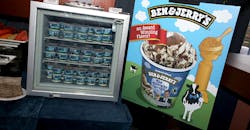Unilever Cuts Costs on Flights, Products as Activists Circle
Unilever is sharpening its focus on profitability by lifting prices and cutting spending on everything from employee flights to product ingredients as activist investors take aim at consumer-goods giants wrestling with slow growth.
The maker of Hellmann’s mayonnaise and Dove soap said Thursday it’s stepping up an efficiency drive as it responds to a failed takeover bid from Kraft Heinz Co. and rivals Nestle SA and Procter & Gamble Co. come under pressure from activists Dan Loeb and Nelson Peltz.
“If it really benefits the long-term shareholders and there is constructive change to the benefit of the company, then at times it might be good to have actively involved investors,” Chief Executive Officer Paul Polman said in an interview with Bloomberg TV, after the company reported first-half earnings that exceeded estimates.
The Anglo-Dutch company increased prices by 3% in the second quarter, offsetting stagnant volumes, it said in a statement Thursday. That helped underlying sales rise by the same percentage. The shares rose as much as 1.2% in early London trading.
Unilever said it achieved savings of more than 1 billion euros in the first half, putting it on track for a target of 6 billion euros (US$6.9 billion) and a 20% underlying operating margin by 2020. It cut 500 million euros through supply-chain initiatives, including reducing the cost of ingredients in laundry brands. Spending on advertising agencies was down 17%.
“The good people of Unilever took 30% less flights in the first six months of the year,” Chief Financial Officer Graeme Pitkethly said in an interview. The cost per seat of every flight taken was down about 24%, he said.
As the company steps up efficiencies in the second half, profit margins could rise by more than 1 percentage point for the full year, Polman said on a call with analysts.
The underlying revenue gain at London- and Rotterdam-based Unilever compared with the 3.1% median estimate of analysts surveyed by Bloomberg. Growth accelerated slightly from the first quarter’s 2.9% uptick. The volume sold in the period was unchanged, with price increases of 3% accounting for the growth in sales.
“As we expected, the results were strong -- broadly in-line on sales growth, but a ‘wow’ over-delivery on margins,” Andrew Wood, an analyst at Sanford C. Bernstein, said in a note.
Unilever shares have gained about 25% since Kraft Heinz’s takeover approach was made public in February. The company pledged greater profitability after spurning the bid, increased its dividend payment by 12% and has committed to repurchasing 5 billion euros worth of stock. Since then Loeb’s Third Point has disclosed a stake in Nestle while Peltz’s Trian Fund Management has begun a campaign at Procter & Gamble.
Unilever said in April it’s seeking to divest its Flora margarine spreads division by the end of the year. The process could fetch an enterprise value of around 6.6 billion euros, a Bloomberg survey of analysts has found.
Selling the unit at the same multiple as the 20 times earnings that Reckitt Benckiser Group Plc fetched this week in the $4.2 billion sale of its mustard and hot-sauce business “would be terrific,” Pitkethly said. Different multiples apply to the declining margarine category, he said, “but my boss has flagged the multiple to me.”
By Thomas Buckley
About the Author
Bloomberg
Licensed content from Bloomberg, copyright 2016.
